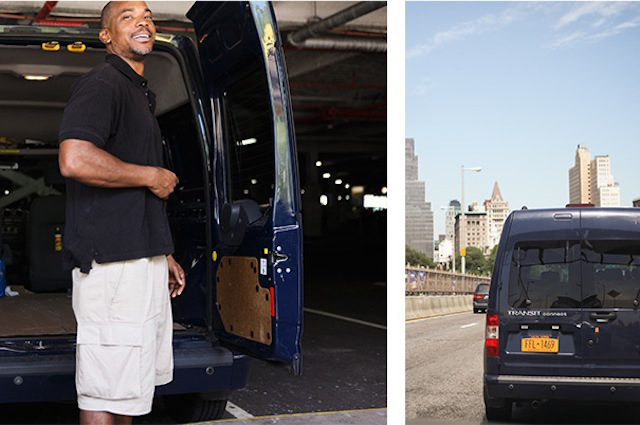The man who goes to IKEA almost every day... voluntarily
"I spent the first year going to IKEA for other people, and every time I was there I would buy something for myself."

A free daily email with the biggest news stories of the day – and the best features from TheWeek.com
You are now subscribed
Your newsletter sign-up was successful

There it is, that blue-and-yellow smorgasbord of particle board furniture, post-modern bedroom sets, and an endless bounty of Swedish fish. It's amazing and convenient, or cheap and annoying, but regardless, you've probably owned an IKEA couch or watched a movie on one at some point in your life. Supposedly, IKEA products are designed for "easy assembly." But those of us who have spent hour upon hour trying to decipher a diagram of vague, wordless instructions, lining up half-perforated holes and securing them with screws — only to discover there are too many screws, or too few, and that the holes were not quite lined up well enough in the first place — well, we know better.
For people like us, there's Eric Rhea. A thin, muscular man in his forties, Rhea works out and lifts weights several times a week. Still, he is not a particularly big guy. He doesn't look like he hauls countless ready-to-assemble flat packs of heavy particle board, wood and metal day after day after day. But that's exactly what Eric Rhea does.
His business, IDA Flatpack Furniture Services — originally IKEA Delivery Alternative before Rhea heard from the store's legal department — is dedicated almost exclusively to delivering and assembling IKEA furniture. (Rhea also makes the occasional trip to West Elm or Crate and Barrel, for variety's sake.)
The Week
Escape your echo chamber. Get the facts behind the news, plus analysis from multiple perspectives.

Sign up for The Week's Free Newsletters
From our morning news briefing to a weekly Good News Newsletter, get the best of The Week delivered directly to your inbox.
From our morning news briefing to a weekly Good News Newsletter, get the best of The Week delivered directly to your inbox.
(More from Narratively: Behind the scenes with the art world's silent schleppers)
IKEA offers delivery starting at $99, but does not provide assembly services; those are outsourced, in a way. When asked for a comment, the company pointed to its website, where an item in a Frequently Asked Questions section offers a sort of veiled assembly warning for the uninitiated: "IKEA products are generally easy to assemble and require no special tools. If you prefer, most IKEA stores can refer you to a reputable, reasonably priced assembly company that can come to your home to assemble and install our products." Rhea operates one of those businesses, and he has been recommended to IKEA shoppers. But mostly, Rhea does business the old-fashioned way — by word-of-mouth (though websites like Yelp have become increasingly important).

I first heard of Rhea from an ex-boyfriend, Alex, who needed furniture for his new third-floor walkup. For slightly more than the standard delivery fee charged by IKEA and many moving companies, Rhea picked Alex and his flat-pack purchases up in front of the Red Hook store, drove to Alex's new apartment in Brooklyn Heights, helped carry the items up the narrow staircase, and built the furniture in an afternoon. Alex was impressed, not only with Rhea's fluency in IKEA Swedish — the man knows the Swedish name of every item in the store's catalogue — but also with Rhea's knowledge of the different colors and finishes of each product. He commented on Alex's choice of the black-brown Malm bed rather than the medium-brown. He even advised Alex on where to place his furniture in his apartment. By the time Rhea left that afternoon, Alex had a place to sleep and sit and put his coffee, and he was very glad to have stumbled upon Rhea's advertisement. Judging from Rhea's busy schedule and his Yelp reviews, so are a lot of other people.
I met Rhea on Canal Street at nine sharp one Thursday morning earlier this summer. After jumping into the passenger side of his van, we drove to IKEA to pick up furniture for a client so I could watch the master in action.
A free daily email with the biggest news stories of the day – and the best features from TheWeek.com
(More from Narratively: Who is Roger Dean Fischer? A tale of homemade bombs and coal-fired pizza)
Rhea speaks in full paragraphs. As we drove through the Holland Tunnel, he told me about his background — he grew up in Detroit and moved to New York after college — and the demands of the job (strained muscles, sore muscles, pulled muscles). Although he was a bit guarded about revealing his business model and income, he seemed gratified to have an audience. Rhea and I pulled up to the Paramus, N.J., store just as it was opening. The smell of cinnamon buns was almost overpowering; it was still too early for Swedish meatballs.

I had been to IKEA stores plenty of times before, but never with such a strong sense of purpose. When I moved into my first apartment after college and was trying to acquire the trappings of adult life (shower curtain liners, for instance), my roommates and I would frequently take the B61 bus from Greenpoint to Red Hook to spend a day ogling living room setups, clever uses of closet space and the modern lines of Scandinavian design, all the while making regrettable purchases that were often the exact opposite of grown-up.
One time, I left the Red Hook IKEA holding a large stuffed elephant. On other trips, I procured a box of Christmas ornaments (I'm Jewish), a money tree that lasted a suspiciously long time without water, faux-leather cardboard boxes that took an hour to assemble, lingonberry jam, silicone ice cube trays shaped like swizzle sticks and hearts, hundreds of votive candles and more oversized blue IKEA bags than I care to count. Eventually, I had to ban myself from IKEA. My trip with Rhea was the first time I'd been back in four years.
I explained my IKEA shopping problem to Rhea. He assured me that I am not alone.
"I have people who are afraid to go to the store," he told me. "That's another area of my client base. People who are like, 'I know if I go there I will walk out of there with an extra $100 of stuff.'"
(More from Narratively: Hitting the streets with a comic who just won't quit)
Even Rhea isn't immune to the allure of the affordable, somewhat necessary objects that seem to call out to you from the store's never-ending aisles — like the sleek sets of wooden kitchen spoons for 49 cents, or the tiny stuffed creatures that peek out at you from a sea of plushness.
"I spent the first year going to IKEA for other people," Rhea said," and every time I was there I would buy something for myself."
The fact that people end up buying unexpected things while they are in IKEA is no accident. The store layout basically amounts to a one-way maze that winds through showrooms and marketplaces with thousands upon thousands of products. By the time a customer gets to the storeroom at the end, carts are often full of impulse buys.
But Rhea has learned to avoid the maze, and the temptation. "I go in the exit," he says proudly.
Like many people, Rhea had his first IKEA encounter in college, when his living situation was temporary and his furniture disposable, with about a year-long shelf life. When Rhea and a roommate moved into an off-campus apartment at Howard University, Rhea's mother offered to help furnish the new apartment. She shopped at what was then a new Swedish furniture store.
Rhea remembers that couch his mom bought.
Read the rest of the story at Narratively.
Narratively is an online magazine devoted to original, in-depth and untold stories. Each week, Narratively explores a different theme and publishes just one story a day. It was one of TIME's 50 Best Websites of 2013.
-
 Why is the Trump administration talking about ‘Western civilization’?
Why is the Trump administration talking about ‘Western civilization’?Talking Points Rubio says Europe, US bonded by religion and ancestry
-
 Quentin Deranque: a student’s death energizes the French far right
Quentin Deranque: a student’s death energizes the French far rightIN THE SPOTLIGHT Reactions to the violent killing of an ultraconservative activist offer a glimpse at the culture wars roiling France ahead of next year’s elections.
-
 Secured vs. unsecured loans: how do they differ and which is better?
Secured vs. unsecured loans: how do they differ and which is better?the explainer They are distinguished by the level of risk and the inclusion of collateral